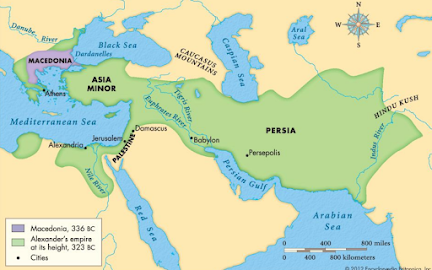The Hellenistic period covers the time in Mediterranean history after Classical Greece, between the death of Alexander the Great in 323 BC until 31 B.C., when Roman troops conquered the last of the territories that the Macedonian king had once ruled.
Hellenistic civilization represents the zenith of Greek influence in the ancient world from 323BC to about 146BC. Hellenistic civilization was preceded by the Classical Hellenic period, and followed by Roman rule over the areas Greece had earlier dominated – even though much of Greek culture, religion, art and literature still permeated Rome's rule.
The word “Hellenistic” comes from the word Hellazein, which means “to speak Greek or identify with the Greeks.”
The spread of Hellenistic culture was sparked by the conquests of Alexander the Great. After his ventures of the Persian Empire, Hellenistic kingdoms were established throughout southwest Asia and north-east Africa. Alexander had plans to construct new cities, roads, and harbors, and continue expansion (possibly into Arabia), but he died before he got the chance in 323 BC.
The ancient writer Herodotus report that initially Greece was the residence of barbarians and at some point, in time first the Dorians separated from the barbarian Pelasgeans and created a separate nation, the Greek. Greek (also called Hellenic) culture blended with Egyptian, Persian, and Indian influences, a blending which came to be known as Hellenistic culture.
Agriculture (throughout the periods) is the dominant area of production furnishing the main income of cities. The “citizen” land owners constitute a small segment of the population as the rest being mostly slaves deprived of any material means.
People, like goods, moved fluidly around the Hellenistic kingdoms. Almost everyone in the former Alexandrian empire spoke and read the same language: koine, or “the common tongue,” a kind of colloquial Greek.
In the Greek city states by 5th century B.C. and in Rome by 2nd century B.C. slavery became a dominant form. It was the high number of slaves used in all production that permitted a "freedom" and "democracy" to a non-laboring population.
The spread of Greek culture throughout the Near East and Asia owed much to the development of cities. Settlements situated on trade routes allowed cultures to mix and spread. Social and cultural changes brought about changes in Greek religious practices. Individualistic feelings contributed to a new fascination with mystery cults, which often promised reward in the form of a better afterlife. New deities were introduced to Greece from areas such as Egypt and Syria, a result of cosmopolitanism and cultural exchange.
Hellenic period and culture
An Introduction to Nuo Mi Xiang Pu-erh (Glutinous Rice Fragrant Tea)
-
Glutinous Rice Fragrant Tea, also known as *Nuo Mi Xiang Pu-erh*, is a
distinctive specialty within the world of Chinese teas. It combines the
smooth, ea...
